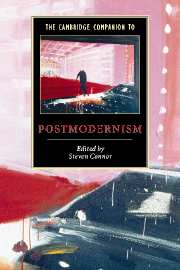Book contents
- Frontmatter
- Introduction
- 1 Postmodernism and philosophy
- 2 Postmodernism and film
- 3 Postmodernism and literature
- 4 Postmodernism and art
- 5 Postmodernism and performance
- 6 Postmodernism and space
- 7 Science, technology, and postmodernism
- 8 Postmodernism and post-religion
- 9 Postmodernism and ethics against the metaphysics of comprehension
- 10 Law and justice in postmodernity
- Further reading
- Index
- Sereis List
3 - Postmodernism and literature
Published online by Cambridge University Press: 28 May 2006
- Frontmatter
- Introduction
- 1 Postmodernism and philosophy
- 2 Postmodernism and film
- 3 Postmodernism and literature
- 4 Postmodernism and art
- 5 Postmodernism and performance
- 6 Postmodernism and space
- 7 Science, technology, and postmodernism
- 8 Postmodernism and post-religion
- 9 Postmodernism and ethics against the metaphysics of comprehension
- 10 Law and justice in postmodernity
- Further reading
- Index
- Sereis List
Summary
Against poetics
Postmodernism was not the invention of literary critics, but literature can certainly claim to be one of the most important laboratories of postmodernism. Perhaps because of the sheer weight of numbers in literary studies during the 1970s and 1980s, as compared with the numbers of scholars writing or students reading in architecture, film studies, or the embryonic disciplines of women's studies or cultural studies, ideas of postmodernism tended in these formative decades to be framed by reference to literary examples.
Literary postmodernism has tended to be focused on one kind of writing, namely, narrative fiction. The most influential books on literary postmodernism, such as Linda Hutcheon’s A Poetics of Postmodernism and Brian McHale’s Postmodernist Fiction, are devoted to postmodern fiction. It seems oddly fitting that what Hutcheon calls the “poetics of postmodernism” should turn out to be most in evidence in its fiction. One might almost say that the move from modernism to postmodernism involves a move from poetry to fiction. Whether in the puckered vortex of the imagist poem or in the dynamic anthologies of allusions, meanings, and voices characteristic of long poems like Eliot’s The Waste Land, Pound’s Cantos, David Jones’s In Parenthesis and William Carlos Williams’s Paterson, the effort of the modernist poem was to condense the complexity of time and history, to make them apprehensible in a single frame.
- Type
- Chapter
- Information
- The Cambridge Companion to Postmodernism , pp. 62 - 81Publisher: Cambridge University PressPrint publication year: 2004
- 9
- Cited by



